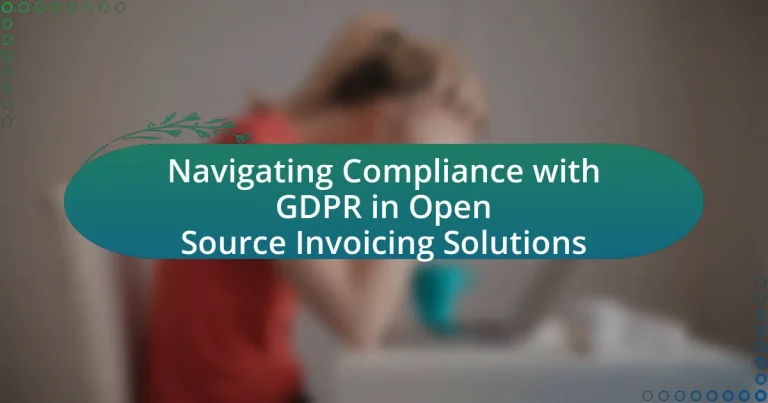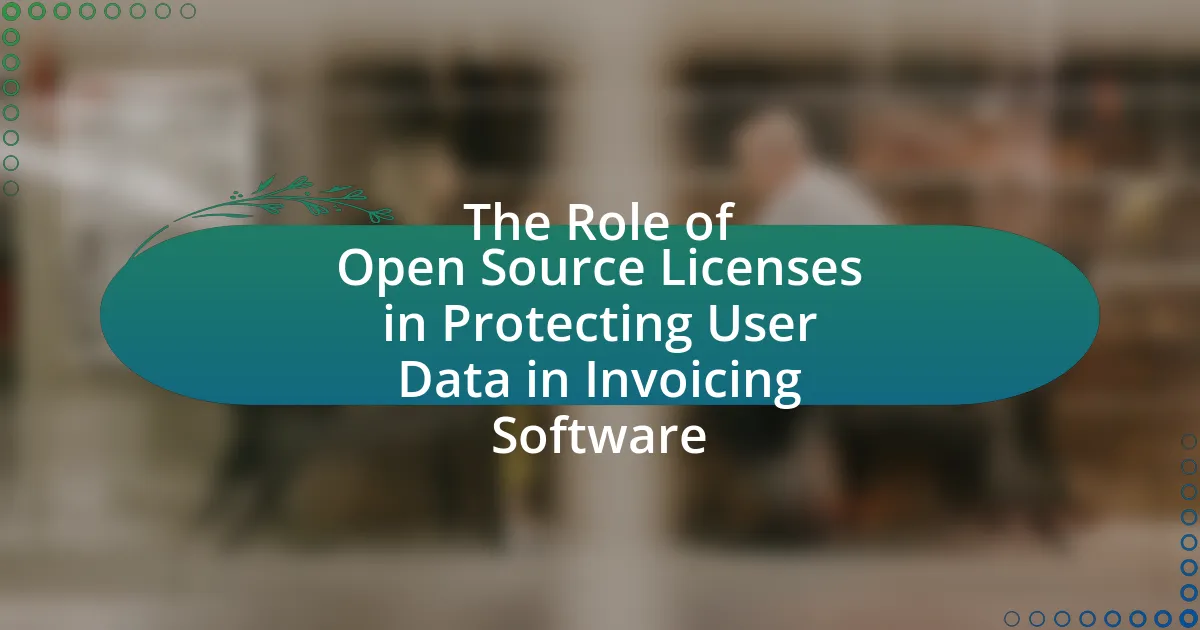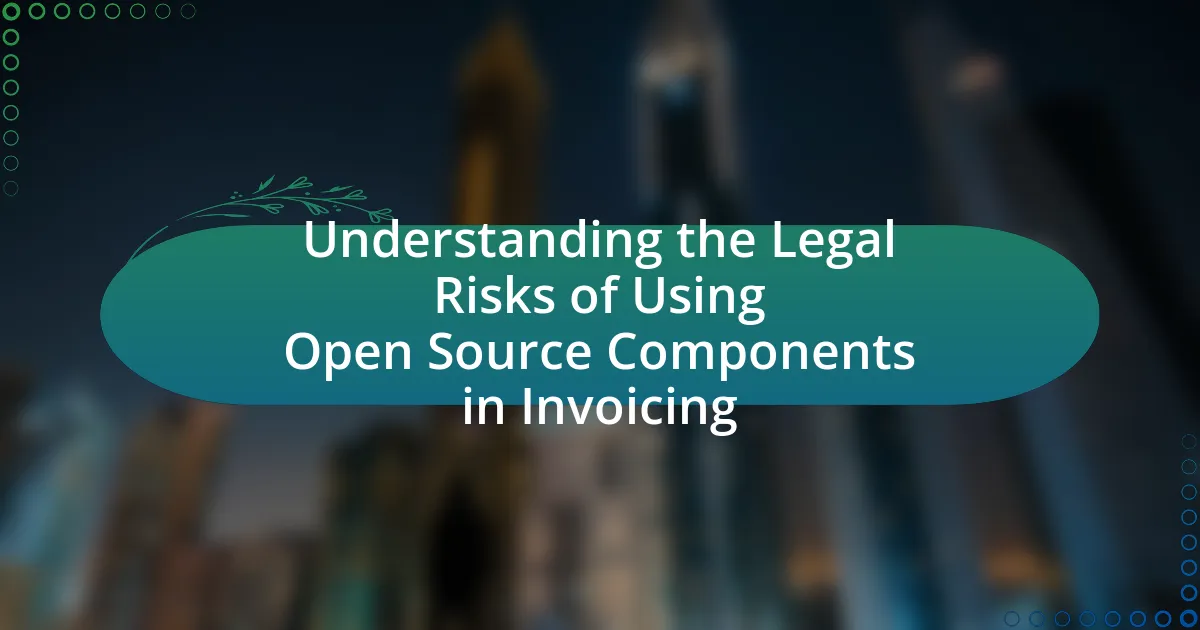The article focuses on the General Data Protection Regulation (GDPR) and its significance for open source invoicing solutions. It outlines the essential compliance requirements, including data protection by design, user consent mechanisms, and the principles of data minimization and accountability. The discussion highlights the implications of non-compliance, such as substantial fines and reputational damage, while also addressing the challenges developers face in ensuring adherence to GDPR. Additionally, it explores practical steps and emerging innovations that can facilitate compliance, emphasizing the importance of robust data protection measures in managing personal data within invoicing systems.
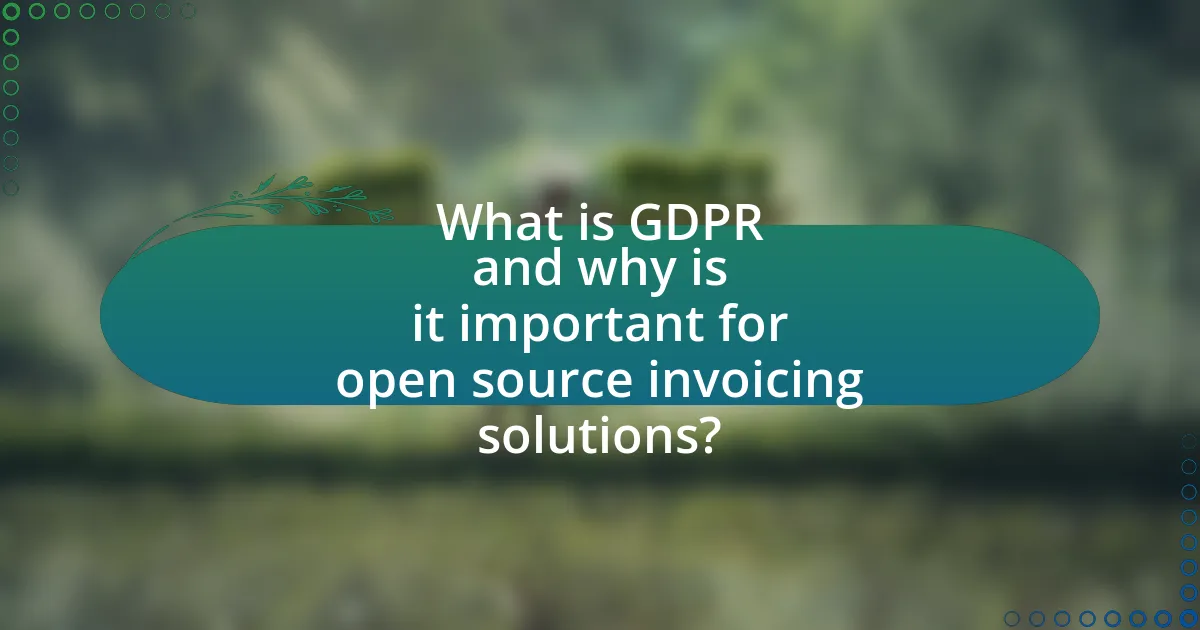
What is GDPR and why is it important for open source invoicing solutions?
GDPR, or the General Data Protection Regulation, is a comprehensive data protection law in the European Union that governs how personal data is collected, processed, and stored. It is important for open source invoicing solutions because these platforms often handle sensitive customer information, including payment details and personal identifiers. Compliance with GDPR ensures that user data is managed transparently and securely, reducing the risk of data breaches and legal penalties. Non-compliance can lead to fines of up to 4% of annual global turnover or €20 million, whichever is higher, emphasizing the necessity for open source invoicing solutions to implement robust data protection measures.
How does GDPR impact data handling in open source invoicing solutions?
GDPR mandates that open source invoicing solutions must ensure the protection of personal data, requiring developers to implement stringent data handling practices. This includes obtaining explicit consent from users before processing their data, ensuring data minimization, and providing users with the right to access, rectify, and delete their personal information. Furthermore, open source solutions must incorporate security measures to protect data from breaches, as stipulated by GDPR Article 32, which emphasizes the importance of data security in processing. Compliance with these regulations not only protects user privacy but also mitigates the risk of substantial fines, which can reach up to 4% of annual global turnover or €20 million, whichever is higher, as outlined in GDPR Article 83.
What are the key principles of GDPR relevant to invoicing solutions?
The key principles of GDPR relevant to invoicing solutions include data minimization, purpose limitation, accuracy, storage limitation, integrity and confidentiality, and accountability. Data minimization mandates that only necessary personal data for invoicing should be collected and processed. Purpose limitation requires that data collected for invoicing is used solely for that purpose and not for unrelated activities. Accuracy emphasizes the need for maintaining up-to-date and correct data, while storage limitation restricts the retention of personal data to the time necessary for invoicing purposes. Integrity and confidentiality ensure that personal data is processed securely to prevent unauthorized access, and accountability obligates invoicing solutions to demonstrate compliance with these principles through documentation and policies. These principles are foundational to ensuring that invoicing solutions operate within the legal framework established by GDPR.
How does GDPR define personal data in the context of invoicing?
GDPR defines personal data as any information that relates to an identified or identifiable natural person, which includes data such as names, addresses, email addresses, and financial information found in invoices. In the context of invoicing, this means that any data included in an invoice that can be used to identify an individual, such as the recipient’s name and billing address, qualifies as personal data under GDPR. This classification mandates that organizations handling such invoices must comply with GDPR requirements, including obtaining consent for data processing and ensuring data protection measures are in place.
What are the main compliance requirements for open source invoicing solutions under GDPR?
Open source invoicing solutions must adhere to several key compliance requirements under the General Data Protection Regulation (GDPR). These requirements include ensuring data protection by design and by default, obtaining explicit consent from users for data processing, implementing robust data security measures, and providing users with the right to access, rectify, and erase their personal data. Additionally, these solutions must maintain clear documentation of data processing activities and conduct Data Protection Impact Assessments (DPIAs) when necessary. Compliance with these requirements is essential to avoid potential fines, which can reach up to 4% of annual global turnover or €20 million, whichever is higher, as stipulated by the GDPR.
What steps must be taken to ensure data protection by design?
To ensure data protection by design, organizations must integrate data protection measures into the development process from the outset. This involves conducting a data protection impact assessment (DPIA) to identify and mitigate risks associated with personal data processing. Additionally, implementing data minimization principles ensures that only necessary data is collected and processed. Organizations should also incorporate strong access controls and encryption to protect data at rest and in transit. Regular training for employees on data protection practices is essential to foster a culture of compliance. These steps align with GDPR requirements, which mandate that data protection be a fundamental aspect of any processing activity.
How can open source invoicing solutions implement user consent mechanisms?
Open source invoicing solutions can implement user consent mechanisms by integrating explicit consent forms that require users to agree to data processing terms before using the software. This approach aligns with GDPR requirements, which mandate that consent must be informed, specific, and unambiguous.
To ensure compliance, these solutions can utilize features such as checkboxes for users to opt-in for data collection, clear explanations of what data will be collected, and how it will be used. Additionally, they can provide users with the ability to withdraw consent easily at any time, reinforcing their control over personal data.
Implementing these mechanisms not only adheres to legal standards but also builds trust with users, as evidenced by studies showing that transparency in data handling increases user confidence in digital platforms.
What challenges do developers face in ensuring GDPR compliance?
Developers face several challenges in ensuring GDPR compliance, primarily due to the complexity of the regulation and the need for robust data protection measures. One significant challenge is the requirement for explicit consent from users before processing their personal data, which necessitates implementing clear consent mechanisms within applications. Additionally, developers must ensure that data is stored securely and that users have the ability to access, rectify, or delete their data, which can complicate system architecture and data management processes.
Moreover, the need for regular audits and documentation to demonstrate compliance adds to the workload, as developers must maintain detailed records of data processing activities. The evolving nature of GDPR interpretations and enforcement also poses a challenge, as developers must stay updated on legal changes and adapt their solutions accordingly. These challenges are compounded in open source environments, where collaboration and transparency are essential but can lead to difficulties in maintaining compliance across diverse contributions and user bases.
How can developers address the issue of data portability?
Developers can address the issue of data portability by implementing standardized data formats and APIs that facilitate the easy transfer of user data between different systems. By adhering to standards such as JSON or XML for data representation and utilizing RESTful APIs, developers can ensure that users can export their data in a format that is widely accepted and easily importable into other platforms. This approach aligns with GDPR requirements, which mandate that individuals have the right to obtain their personal data in a structured, commonly used, and machine-readable format. Furthermore, the European Data Protection Board emphasizes the importance of interoperability in achieving effective data portability, reinforcing the need for developers to prioritize these technical solutions in their open-source invoicing solutions.
What are the implications of data breaches under GDPR for invoicing solutions?
Data breaches under GDPR have significant implications for invoicing solutions, primarily involving legal liability, financial penalties, and reputational damage. Invoicing solutions that process personal data must comply with GDPR requirements, including data protection by design and by default. If a data breach occurs, organizations may face fines up to €20 million or 4% of their global annual turnover, whichever is higher, as stipulated in Article 83 of the GDPR. Additionally, companies are required to notify affected individuals and the relevant supervisory authority within 72 hours of becoming aware of a breach, as outlined in Article 33. Failure to comply can lead to further sanctions and loss of customer trust, impacting business operations and revenue.
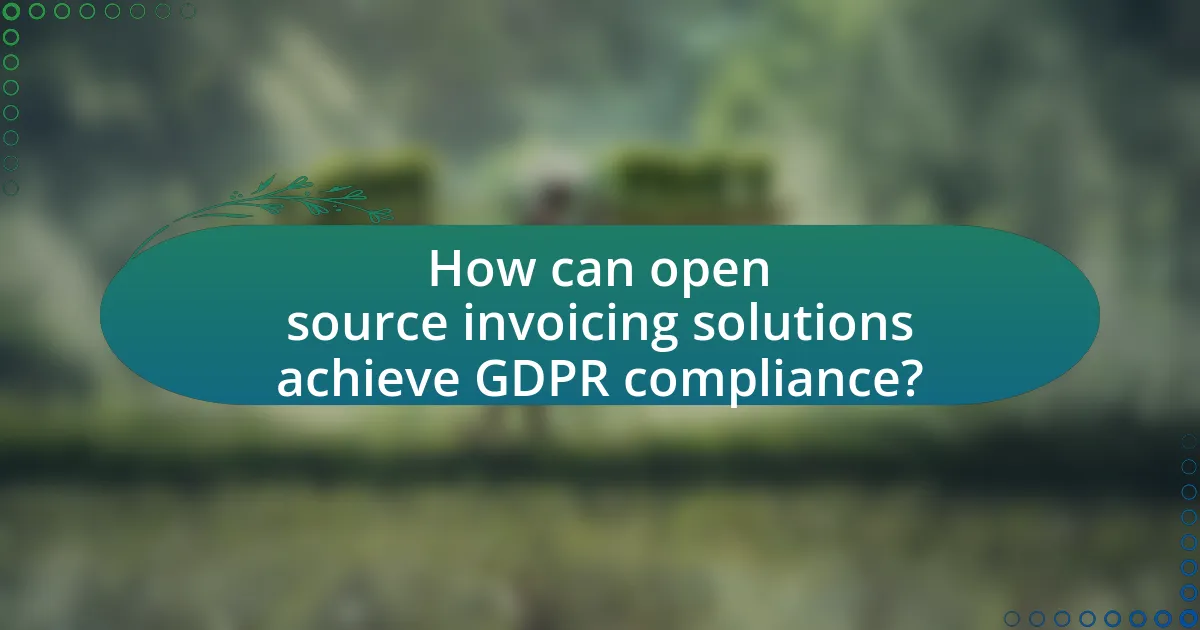
How can open source invoicing solutions achieve GDPR compliance?
Open source invoicing solutions can achieve GDPR compliance by implementing robust data protection measures, ensuring user consent for data processing, and providing transparency in data handling practices. These solutions must incorporate features such as data encryption, access controls, and the ability to delete or anonymize personal data upon user request. Additionally, they should include clear privacy policies that inform users about data collection, processing purposes, and their rights under GDPR. Compliance can be validated through regular audits and updates to align with evolving regulations, ensuring that the software remains secure and user data is protected.
What tools and practices can assist in GDPR compliance for invoicing solutions?
Tools and practices that assist in GDPR compliance for invoicing solutions include data encryption, access controls, and regular audits. Data encryption protects sensitive information during transmission and storage, ensuring that only authorized personnel can access it. Access controls limit user permissions based on roles, reducing the risk of unauthorized data exposure. Regular audits help identify compliance gaps and ensure that invoicing practices align with GDPR requirements. Implementing these measures not only safeguards personal data but also demonstrates a commitment to data protection, which is essential for compliance with GDPR regulations.
How can encryption be utilized to protect personal data in invoicing?
Encryption can be utilized to protect personal data in invoicing by converting sensitive information into a coded format that can only be accessed by authorized parties. This process ensures that data such as names, addresses, and payment details remain confidential during transmission and storage. For instance, using Advanced Encryption Standard (AES) can secure invoice data, making it unreadable to unauthorized users. According to the European Union Agency for Cybersecurity, encryption is a key measure for compliance with GDPR, as it mitigates risks associated with data breaches and enhances the protection of personal data.
What role do audits play in maintaining GDPR compliance?
Audits play a critical role in maintaining GDPR compliance by systematically evaluating an organization’s data processing activities against GDPR requirements. These audits help identify potential risks, gaps, and non-compliance issues, enabling organizations to implement corrective measures. According to the European Data Protection Board, regular audits are essential for demonstrating accountability and ensuring that personal data is processed lawfully, transparently, and securely. By conducting audits, organizations can also maintain accurate records of processing activities, which is a key requirement under Article 30 of the GDPR.
What are the best practices for maintaining ongoing compliance?
The best practices for maintaining ongoing compliance with GDPR in open source invoicing solutions include regular audits, employee training, data protection impact assessments, and implementing robust data security measures. Regular audits help identify compliance gaps and ensure adherence to GDPR requirements, while employee training fosters a culture of data protection awareness. Conducting data protection impact assessments allows organizations to evaluate risks associated with data processing activities, and implementing robust data security measures, such as encryption and access controls, protects personal data from breaches. These practices collectively support sustained compliance and mitigate risks associated with non-compliance.
How can regular training for developers enhance compliance efforts?
Regular training for developers enhances compliance efforts by ensuring they are well-versed in the latest regulations and best practices related to data protection, such as GDPR. This ongoing education equips developers with the knowledge to implement secure coding practices, conduct thorough data audits, and recognize compliance risks early in the development process. For instance, a study by the International Association of Privacy Professionals found that organizations with regular compliance training reported a 30% reduction in data breaches. By fostering a culture of compliance through continuous learning, developers can better align their work with legal requirements, ultimately leading to more secure and compliant open-source invoicing solutions.
What documentation is necessary to demonstrate compliance with GDPR?
To demonstrate compliance with GDPR, organizations must maintain specific documentation, including a Data Protection Impact Assessment (DPIA), records of processing activities, privacy notices, data processing agreements, and evidence of consent. The DPIA assesses risks related to data processing, while records of processing activities detail how personal data is handled. Privacy notices inform individuals about data usage, and data processing agreements outline responsibilities between data controllers and processors. Evidence of consent is crucial for validating lawful data processing. These documents collectively ensure transparency and accountability, which are fundamental principles of GDPR compliance.
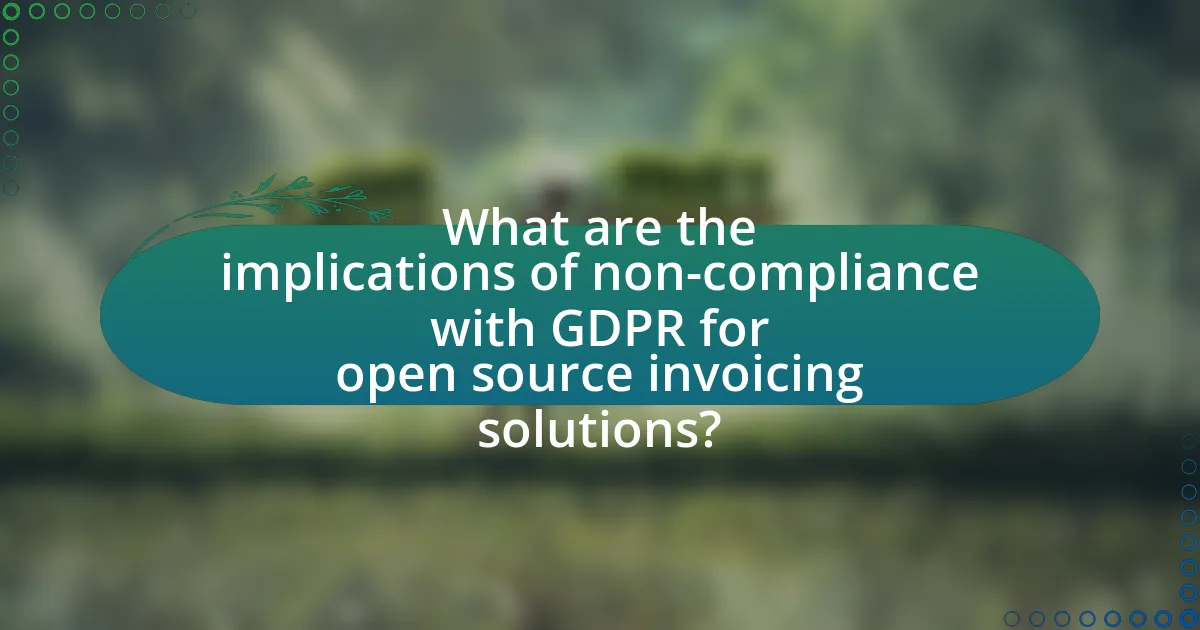
What are the implications of non-compliance with GDPR for open source invoicing solutions?
Non-compliance with GDPR for open source invoicing solutions can lead to significant legal and financial repercussions. Organizations using these solutions may face fines of up to €20 million or 4% of their annual global turnover, whichever is higher, as stipulated by GDPR regulations. Additionally, non-compliance can result in reputational damage, loss of customer trust, and potential legal actions from affected individuals whose data rights have been violated. Furthermore, open source projects may struggle to attract contributors and users if they are perceived as non-compliant, hindering their growth and sustainability in a competitive market.
What penalties can organizations face for failing to comply with GDPR?
Organizations that fail to comply with GDPR can face significant penalties, including fines of up to €20 million or 4% of their annual global turnover, whichever is higher. These penalties are enforced by data protection authorities across EU member states, reflecting the severity of non-compliance. For instance, in 2021, Amazon was fined €746 million by Luxembourg’s data protection authority for GDPR violations, illustrating the financial risks associated with non-compliance.
How can reputational damage affect open source invoicing solutions?
Reputational damage can significantly undermine the trust and credibility of open source invoicing solutions. When users perceive a lack of reliability or security, particularly in the context of GDPR compliance, they may abandon these solutions in favor of more established alternatives. For instance, a breach of user data or failure to comply with GDPR can lead to negative publicity, which diminishes user confidence and can result in decreased adoption rates. According to a 2021 study by the Ponemon Institute, organizations that experience reputational damage due to data breaches can see a 30% decline in customer retention. This decline directly impacts the sustainability and growth of open source invoicing solutions, as they rely heavily on community trust and user engagement.
What legal actions can be taken against non-compliant invoicing solutions?
Legal actions against non-compliant invoicing solutions include fines, penalties, and potential lawsuits. Regulatory bodies can impose fines for violations of GDPR, which can reach up to 4% of annual global turnover or €20 million, whichever is higher. Additionally, affected individuals or entities may file lawsuits for damages resulting from non-compliance, seeking compensation for any harm caused. These actions are supported by the enforcement mechanisms established under GDPR, which aim to ensure compliance and protect individuals’ data rights.
What are the future trends in GDPR compliance for open source solutions?
Future trends in GDPR compliance for open source solutions include increased automation of compliance processes, enhanced privacy by design principles, and greater community collaboration on compliance tools. Automation will streamline data protection impact assessments and consent management, making it easier for developers to ensure compliance. Enhanced privacy by design will lead to the integration of GDPR requirements directly into the software development lifecycle, ensuring that open source solutions are built with compliance in mind from the outset. Community collaboration will foster the development of shared compliance resources and tools, allowing open source projects to benefit from collective expertise and best practices. These trends are driven by the growing importance of data protection and the need for transparency in handling personal data, as evidenced by the increasing number of GDPR enforcement actions and the emphasis on accountability in data processing activities.
How might evolving regulations impact open source invoicing solutions?
Evolving regulations, particularly those related to data protection like GDPR, can significantly impact open source invoicing solutions by necessitating enhanced compliance measures. Open source invoicing solutions must adapt to ensure they handle personal data in accordance with legal requirements, which may involve implementing stricter data encryption, user consent protocols, and data access controls. For instance, GDPR mandates that organizations demonstrate accountability in data processing, compelling open source projects to integrate features that allow users to manage their data rights effectively. Failure to comply with these regulations can result in substantial fines, as evidenced by the European Data Protection Board’s enforcement actions, which have imposed penalties exceeding €400 million since GDPR’s implementation.
What innovations are emerging to facilitate compliance in invoicing software?
Emerging innovations in invoicing software to facilitate compliance include automated compliance checks, real-time data encryption, and integration with regulatory APIs. Automated compliance checks streamline the invoicing process by ensuring that all invoices adhere to legal requirements, reducing the risk of human error. Real-time data encryption protects sensitive information during transmission and storage, aligning with GDPR mandates for data protection. Integration with regulatory APIs allows invoicing software to stay updated with changing compliance requirements, ensuring ongoing adherence to laws such as GDPR. These innovations collectively enhance the reliability and security of invoicing processes in compliance with legal standards.
What practical steps can developers take to ensure compliance with GDPR?
Developers can ensure compliance with GDPR by implementing data protection by design and by default, which requires integrating privacy measures into the development process from the outset. This includes conducting Data Protection Impact Assessments (DPIAs) to identify and mitigate risks associated with personal data processing. Additionally, developers should ensure that user consent is obtained and documented clearly, allowing users to easily access, modify, or delete their personal data.
Furthermore, developers must implement strong data security measures, such as encryption and access controls, to protect personal data from unauthorized access. Regular audits and updates to privacy policies are also essential to maintain compliance as regulations evolve. These steps are supported by GDPR Article 25, which emphasizes the importance of data protection measures in the design of systems and processes.
